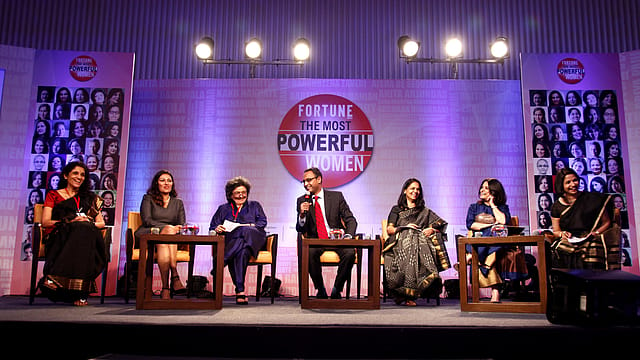Are harassment norms in the workplace misused?
ADVERTISEMENT

There is heated debate internationally about sexual harassment in the workplace. The #MeToo movement, the Harvey Weinstein saga, now the Larry Nasser case have all added fuel to this. There’s been pushback as well, of course, with some people arguing that harassment norms can be misused simply to bring down those in power. We put this question to a panel of India’s most powerful women in business, and here’s what we learnt.
It is not easy for a woman to file a complaint
“In the U.S., 75% of women who complained against being harassed in the workspace were retaliated against, that’s empirical data that exists, 75% of them got into trouble because they were reporting back to the same bosses, went back to the same company, had to deal with the same HR, therefore this is not a situation which is pleasurable to anybody,” said Ameera Shah, managing director, Metropolis Healthcare.
One would imagine that with the implementation of the Sexual Harassment of Women at Workplace (Prevention, Prohibition and Redressal) Act, 2013, which makes it mandatory for companies with more than 10 employees to have an Internal Complaints Committee (ICC), things will be different in India. But that isn’t so. For one, not all companies have formed an ICC. Second, even if such a committee is formed, the complainant is either shamed or their intentions questioned.
Victim shaming is real
Victim shaming is not a figment of imagination. “In a country like India, when a women walks on the street and a man catcalls her, often she is told at her home: ‘your skirt was too short, you must have done something, you must have left your hair open’,” said Shah.
It’s a social issue that is often ignored. Too often, men in positions of power resort to shaming the victim, and questioning their ‘character’ to get out of harassment charges.
India Inc. is a boys club
While on opposite sides of the debate, one thing that everyone agreed upon was the fact that men still hold the most power in the corporate sphere. “There are certain sectors where men actually want to protect their turf, they don’t want women to come into that sector, so they create more and more barriers,” said Meena Ganesh, MD and CEO, Portea Medical.
To put that in global context, of the Fortune 500 companies in 2017, only 32 had women CEOs; Pew Research says 56 of the 146 nations studied by the World Economic Forum in 2014 and 2016 have had a female head of government or state for at least one year in the past half-century.
Both men and women can abuse power
Sexual harassment is about power. And power imbalances can deter women from actually reporting cases. But the fact that power can be misused by women as well cannot be negated.
R.M. Vishakha, MD and CEO of IndiaFirst Life Insurance, said that when we glorify women to say that there is no abuse of power, “we are setting them up yet again with the burden of unequal expectations. We are guilty of gender discrimination when we make the assumption that women need to behave differently from men. At the end of the day, be it men or women, we are all human beings, and women should be no exceptions to equality in behaviour expectation.”
Yes, laws can be misused...
While norms can be misused, it’s too much trouble to actually do so. “In July 2017, the Supreme Court issued a new set of directions to prevent the misuse of Section 498 (a) of the Indian Penal Code [dealing with harassment and abuse of married women]. It was accepted that there is a growing tendency to abuse the said provision to rope in all the relatives, including parents of advanced age, minor children, siblings, grandparents and uncles on the strength of vague and exaggerated allegations without there being any verifiable evidence of physical or mental harm or injury,” Vishakha said.
However, to abuse the law is not that simple. “I think to abuse these norms takes a lot of guts, takes a different kind of vendetta or agenda in one’s mind, and in most of the cases really, the amount of people who are even willing to go and write a complaint is very, very few,” countered Zia Mody, co-founder, AZB & Partners.
...But it’s no case for them to not exist
Even if there are women who have misused dowry laws, it does not mean that the countless women who suffer harassment because of dowry demands should not have a mechanism that can help them.
“I think that rather than concentrate on the relatively smaller number of women who could be taking advantage of this statute to further an agenda, you really have to empower women through the statute even further, because what’s going to stop this, what’s going to stop it is, frankly—scared men. Why is this going to stop? Because the consequence of being stupid in your workplace is now going to have repercussions because earlier you didn’t even think will happen in your life,” said Mody.
There are consequences if laws are misused
Zia Mody shed some light on the difficulty of abusing these norms. “If the complaint, after it is investigated by the committee [ICC] which is formed, is found to be not correct, exaggerated, untrue, you can then be charged for misconduct, termination, and forget about the other actions that the aggrieved man can take,” she said.